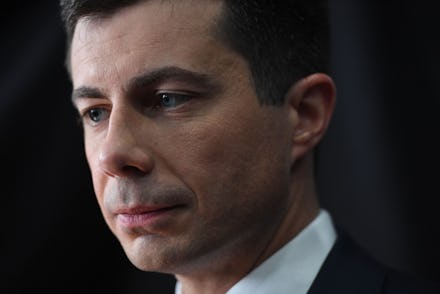What health care in America will look like under Pete Buttigieg

It was a quote heard 'round the World Wide Web. Pete Buttigieg came under fire recently for saying in a Washington Post interview, "I trust you to figure out your own health care." While people pointed out how confusing the health care system is and that their insurance policies can be hundreds of pages long, Buttigieg emphasized that his ultimate goal is making sure everyone is insured and on the plan that's best for them. Is his plan the best, though? Experts tell Mic that there's a lot to like about Buttigieg's health care policy, but they also say it might mean health care remains difficult to "figure out."
Buttigieg has said he wants to move toward universal health care and would like to see Medicare-for-All, but that he would not impose it on people. He calls his plan "Medicare for all who want it" and says it "will help America reach universal coverage," where everyone in the country can access health services.
With this plan, Buttigieg would create a public option for health insurance that anyone could access, no matter what their income is. Premium payments would be capped at 8.5% of income, and Buttigieg says there will be more generous subsidies for high-quality care. But unlike the Medicare-for-All plans put forward by Massachusetts Sen. Elizabeth Warren and Vermont Sen. Bernie Sanders, Buttigieg would allow you to opt out of public coverage and keep your private insurance if you prefer. Anyone who is uninsured and eligible for free public coverage would be automatically enrolled, while those who are eligible for subsidized coverage would be given a "simple enrollment option."
"It's a moderate approach," Dr. Gerald Kominski, senior fellow at the UCLA Center for Health Policy Research, tells Mic. He also points out that it's quite similar to former Vice President Joe Biden's health plan. "But I think it's an important step toward universal coverage."
Kominski says Buttigieg might be taking this approach to appeal not only to moderates but also to conservatives who still have a strong opposition to a single-payer Medicare-for-All system. "He's saying, I'm going to preserve choice and we're going to make the choices more even more affordable," Kominski says.
Sanders, though, has said that the choices make Buttigieg's plan a "failed" one. "When you talk about having a system where you're going to have private insurance and you're going to have (a public) option going in, the rich and the healthy will go into private insurance, the poor and the sick will go into Medicare and cost that system an enormous amount of money," he said, adding that the U.S. should not maintain any version of the "dysfunctional, cruel system that is very, very expensive."
However, when it comes to choices, under Buttigieg's plan there will be at least one that's off the table: There won't be a choice to not be insured. A Buttigieg spokesperson tells Mic that while the campaign is still working out some details on how to enforce this, everyone would be required to have health insurance under the mayor's plan. But unlike the Affordable Care Act, instead of being charged money for not having insurance without getting anything in return, people would either be charged money for not having insurance and then get insurance in return or be charged no money if they're eligible and get insurance in return. While Buttigieg has not yet landed on one specific mechanism for auto-enrolling people in health care coverage, a survey during tax season is one possibility, the spokesperson says. To enforce the insurance requirement, withholding money from tax refunds for those who do not qualify for free coverage, but only for subsidized coverage, would be an option.
Beyond getting everyone insured, Buttigieg says that creating a public option like this would lower costs all around, as private insurers will need to offer more affordable plans in order to compete. And at least one expert agrees with the principle.
"Depending on how it was designed, the presence of a public option would put private plans under quite a bit of financial pressure," Matthew Fiedler, a fellow with the USC-Brookings Schaeffer Initiative for Health Policy, tells Mic. This would then allow private insurers to secure lower prices from doctors and hospitals, which currently charge private insurers much more than they charge government programs like Medicare, and then therefore lower the costs for patients, too.
The way Buttigieg's plan is currently presented leaves a lot of the costs to the private sector, rather than the government, Fiedler points out. Buttigieg says his plan would cost $1.5 trillion over 10 years. In comparison, Sanders' Medicare for All plan would cost $34 trillion over 10 years.
But these financial wins in Buttigieg's proposal have costs elsewhere. "The big trade-off here is simplicity and elegance versus the fiscal costs involved," Fiedler says. While Buttigieg's plan would cost a lot less, "you still have a fairly complicated system at the end of the day that's harder for patients to navigate."